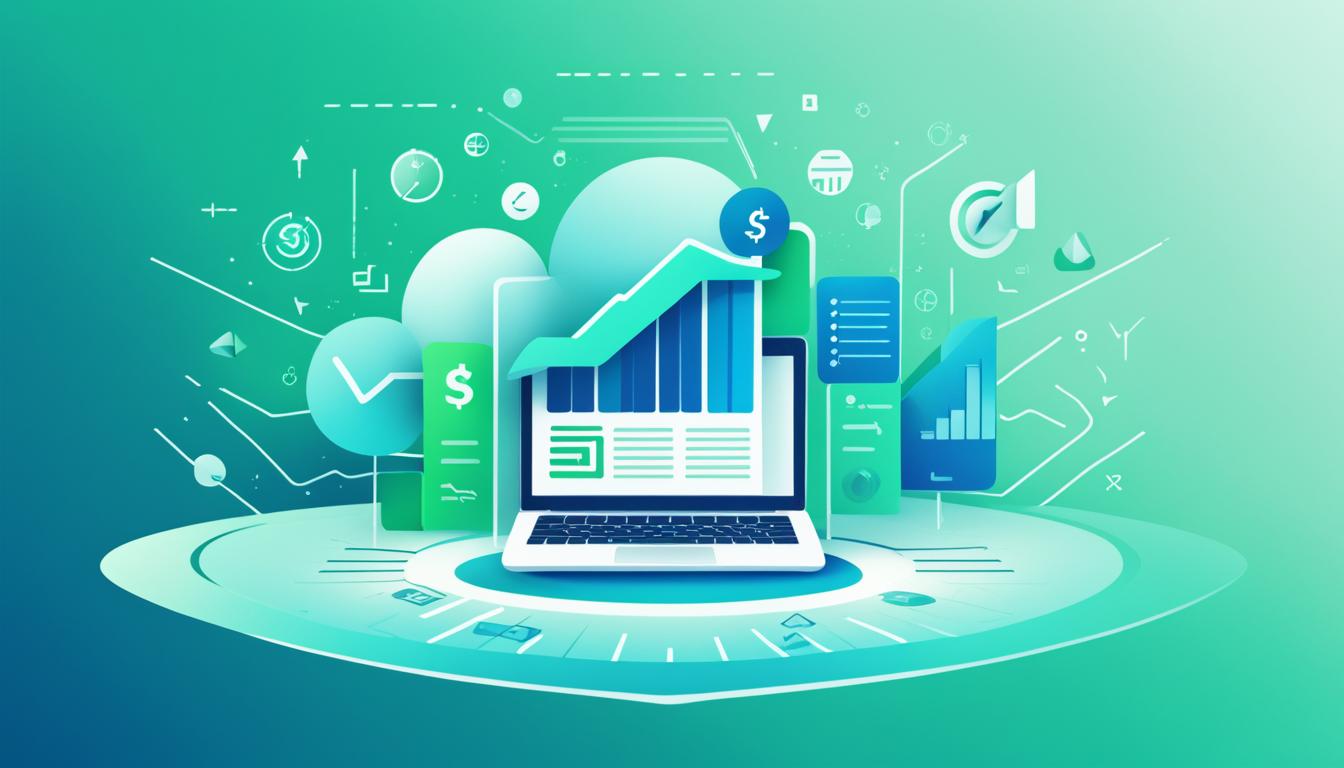Best accounting software for SMEs streamlines financial management and accounting processes
In today’s fast-paced business world, small and medium enterprises (SMEs) are always looking to get better. They want to improve how they handle their finances. The best accounting software for SMEs is key in making this happen. It automates accounting tasks and makes them more accurate.
This lets business owners focus on growing their business and making customers happy. These tools use technology to make things run smoother. They help with everything from sending out invoices to managing payrolls. This is crucial for doing well in a tough market.
Key Takeaways
- The best accounting software significantly improves financial management for SMEs.
- Automation of accounting processes saves time and enhances accuracy.
- Effective software solutions enable better decision-making with insightful reporting.
- Streamlined operations reduce errors and improve overall efficiency.
- Small business accounting tools are essential for competitiveness in the marketplace.
Introduction to Accounting Software for SMEs
Accounting software is key for small businesses, especially for SMEs looking to improve their finances. These tools are made to meet the needs of smaller companies. They make complex tasks easier, avoiding the hassle of manual handling.
Managing finances can be tough for small businesses. Accounting software makes it simpler, letting owners focus on growing their businesses. It offers tools like invoicing, tracking expenses, and reporting on finances. This gives small business owners a clear view of their financial health.
Using good accounting software cuts down on financial errors and helps in making better decisions. It automates many financial tasks. This helps SMEs manage their finances better.
Importance of Financial Management in Small Businesses
Effective financial management is key for small businesses. It helps them succeed in the long run. Small businesses have special challenges. They need good cash flow management to stay stable.
Having a healthy cash flow covers daily costs and helps with growth. Strategic planning is also crucial. It lets small businesses set financial goals and figure out how to reach them.
By focusing on financial planning, entrepreneurs can make smart choices. These choices can move their businesses forward.
Ignoring financial management can lead to big problems. Bad cash flow can cause missed payments and reduce what a business can do. It can even lead to failure. But, with strong financial practices, small businesses can lower risks and increase their chances of doing well.
Best Accounting Software for SMEs: Key Features to Consider
Choosing the right accounting software is key for small and medium enterprises. There are many accounting software features that make managing finances easier and help businesses grow. We’ll look at the main parts that can make a big difference in your accounting.
Invoicing Software Capabilities
Good invoicing software makes sending bills easy. It lets businesses make and send professional invoices to customers. Some software also sends out automatic reminders for payments that are late, keeping cash flow steady.
Expense Tracking Abilities
Strong expense tracking helps manage, sort, and understand business spending. Users can upload receipts and connect them to projects or clients. This gives a clear view of spending, which is key for budgeting and planning finances.
Tax Compliance Functions
Staying in line with tax compliance is crucial to avoid fines and keep good tax standing. Many accounting software have tax calculators and reports built-in. This makes following tax laws easier and helps with accurate tax returns.
Payroll Management Solutions
Integrated payroll management lets businesses automate paying employees. This saves time and cuts down on mistakes from manual calculations. Better payroll tools mean employees get paid right and on time, which boosts morale.
By focusing on these key features, SMEs can make their financial work smoother. This leads to better productivity and accuracy in accounting. For a reliable look at insurance options, check out Trustage’s offerings.
Cloud-Based Accounting: The Modern Solution
Cloud-based accounting is a new way to handle finances that many small businesses prefer. It lets users access their financial info from any device with internet. This makes it easy for business owners and their teams to work together, whether they are in the office or not.
Cloud-based accounting gives you real-time data. This is key for small businesses because it keeps financial info up to date. It helps business owners make quick, informed decisions. Plus, it keeps everyone on the same page about the company’s money matters.
Using cloud-based accounting can make financial tasks easier. Things like sending invoices, tracking expenses, and making reports become simpler with automated tools. This means businesses can spend less time on paperwork and more on growing their business.
For small businesses to succeed today, using cloud-based solutions is crucial. These technologies boost efficiency and meet the changing needs of businesses. They offer valuable tools for managing finances and making decisions.
Streamlining Accounting Processes for Efficiency
Streamlining accounting means making things simpler and more efficient. It’s all about using the latest accounting software to help. This makes things easier and less complicated.
Automation in accounting tools changes how we handle finances every day. It cuts down on repetitive tasks, saving a lot of time. This lets accountants work on bigger, more important tasks. It also makes sure the work is more accurate.
- Adopting cloud-based solutions for real-time data access and collaboration.
- Implementing automated invoicing systems to reduce manual entry.
- Utilizing expense management tools to track and categorize expenses effortlessly.
By making these changes, companies can work better and make fewer mistakes. They get a clearer view of their money. Using technology helps make tasks easier and gets businesses ready for growth.
Benefits of Using Accounting Software
Small and medium enterprises (SMEs) gain a lot from using accounting software. It helps manage financial tasks well, saving time, improving accuracy, and making financial reports better. Knowing these benefits helps businesses make smart choices about their accounting.
Time Savings and Automation
Accounting software automates boring tasks. This means businesses save hours on things like invoicing, reminders, and tracking expenses. With this extra time, they can focus on growing and building better customer relationships.
Improved Accuracy and Reduced Errors
Using accounting software also means fewer mistakes in financial data. Automated calculations are always right, so numbers are correct. This trust in financial reports leads to better decisions and saves money on fixing errors.
Enhanced Financial Reporting
Accounting software makes financial reports clear and easy to get to. Real-time reports help businesses see how they’re doing and make smart choices. This clear view of finances helps with making decisions and following the law.
Top Picks for Best Accounting Software for SMEs
Choosing the right accounting software is key for SMEs to manage their finances well. Here are some top choices for SMEs, focusing on their features, pricing, and ease of use.
QuickBooks Online
QuickBooks Online is a top pick for SMEs. It has many features like tracking expenses, sending invoices, and reporting finances. It’s easy for business owners to use, thanks to its simple interface.
QuickBooks Online also has great customer support. This means users can get help fast if they have problems.
Xero
Xero is great for small businesses. It has powerful invoicing tools, bank reconciliation, and a mobile app. Being cloud-based, Xero lets business owners access it from anywhere.
It’s also affordable and has excellent customer service. This makes it a top choice for SMEs.
FreshBooks
FreshBooks is another top choice for SMEs. It’s known for easy invoicing and tracking time. It’s perfect for service-based businesses.
FreshBooks also has expense tracking and client management. This makes managing finances smooth. The customer support team is quick to help, making the experience better.
Integrating Inventory Management with Accounting Software
For small businesses, linking inventory management with accounting software is key. This combo boosts overall efficiency. It helps track stock levels accurately. When stock info matches financial records, businesses see their cash flow clearly. This leads to better decision-making.
Good inventory management makes processes smoother. It cuts down on stockout or overstocking problems. This means better financial reports that show the real state of the business. With accounting software, updating inventory is automated. This reduces mistakes and saves time.
Using an integrated system helps track sales trends and adjust inventory. This makes customers happier and helps the business grow. The benefits of this integration build a strong base for managing small businesses well.
Customer Testimonials: Success Stories with Accounting Software
More and more businesses are using accounting software to get better at managing money. They share stories of big improvements after starting to use this tech.
A small retail store found it easier to track sales and costs. The owner said,
“Since we started using accounting software, our end-of-day reconciliation has become a breeze. The time savings have been incredible.”
A service-based business had trouble with sending out bills. The owner explained,
“The accounting software impact on our cash flow has been dramatic. We now get paid faster and can devote more time to serving customers instead of managing paperwork.”
These stories show that accounting software helps with more than just making things faster. It also helps businesses stay financially healthy. Users say it helps them make better decisions and leads to better business results. Here are some main points from these stories:
- Improved efficiency in financial tasks
- Time savings leading to increased focus on customer service
- Enhanced cash flow management through timely invoicing
As more businesses share their stories, more are choosing to use accounting software. This shows its big impact across different types of businesses.
Choosing the Right Accounting Software for Your SME
Choosing the right accounting software can be tough for small to medium enterprises. Start by looking at your budget. Knowing what you can spend helps you pick the right option and avoid too many choices.
Then, think about what features you need for your business. Things like invoicing, tracking expenses, and managing payroll are key to being efficient. Make a list of the must-have features your SME needs to run smoothly.
How easy the software is to use is also important. A simple interface means your team can start using it fast, with less hassle. Try demos or trials to see how it feels in real use.
Being able to scale is another key factor. Your accounting software should grow with your business. Pick software that can handle your future needs without needing a big change.
In short, when picking accounting software, think about your SME’s needs. Look at your budget, what features you need, how easy it is to use, and if it can grow with your business. A careful choice means you get a solution that supports your business now and later.
Common Challenges Faced When Adopting Accounting Software
Adopting new accounting software can be tough, especially for small business owners. It’s key to know the main hurdles to make the switch smoother and more effective.
One big issue is data migration. Moving old financial data to a new system can be tricky. It often leads to errors and needs a lot of checking.
Training employees is another big challenge. Many might find new systems hard to learn, causing accounting software difficulties. This can slow down work and lower morale.
Money worries can make things harder too. Small businesses often have tight budgets for both initial costs and ongoing fees. Finding affordable options can ease financial stress while keeping quality high.
To beat these challenges, a proactive plan is needed. This includes detailed planning, good training, and clear talks. Small business owners can succeed by planning for and tackling potential problems with smart strategies.
Conclusion
Choosing the right accounting software is key for SMEs to manage their finances well. It boosts productivity and accuracy, making sure your business runs smoothly. Features like invoicing, tracking expenses, and managing payroll help automate tasks. This lets small businesses focus on growing.
We looked at the main benefits and features of accounting software. It makes financial tasks easier and improves accuracy in reports. Adopting this software is crucial to stay ahead in today’s fast business world.
As businesses grow, it’s important to know what you need in accounting software. Investing in good software helps SMEs improve their financial health and work more efficiently.



